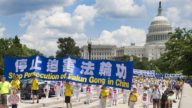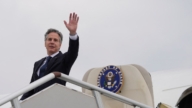【新唐人2011年5月11日讯】为期两天的“美中战略与经济对话”9号在美国华盛顿开幕。美国副总统拜登表示,在人权问题上两国存在很大的意见分歧。而美国国务卿柯林顿则表示,在人权议题上,美国向中国非常明确的表达忧虑。更有外媒报导,中共怕引发国内抗议,望这次对话低调。
美国副总统拜登和国务卿柯林顿,向中共当局表达了对中国人权记录,以及中共正在进行镇压行动的忧虑。
美国副总统拜登:“我们在人权问题上有强烈的分歧,我们关注近期在中国的镇压行动,包括对记者、律师、网络作家以及艺术家的攻击、拘补和无端失踪,我再次重申,真正的友谊绝不会建立在错误的基础上。哪些问题上有分歧,重要的一点是要表达出来。”
不过,《国际先驱论坛报》报导,虽然美中正在展开新一轮战略对话,但是在中国,中共当局对西方的批评却更加剧烈,甚至有中共官员对驻北京的外国官员说,他们认为“美国正在煽动中国革命”。
《国际先驱论坛报》以头版头条刊登文章指出,最近3个月,在中国大陆的外国人,尤其是西方人,感觉来自中共政府的审查和压力越来越大。
报导中提到,今年2月到4月间,至少有60项由美国驻北京使馆组织的活动被取消,据说都是因为中共当局干预,其中包括有外国人参加的文化论坛和学校活动等。此外,中共的教育部对出国访问的学者也多次发出警告,要求他们不要参加“反华”活动。
文章指出,中共当局对一些“非盈利组织”审查的更为严厉,尤其是接受美国政府或欧洲联盟资助的机构,最近频繁受到税务官员的干扰。此外,席卷中东及北非的“茉莉花革命”开始以来,中国国内的许多外国网站,包括Twitter、Facebook、Google等,都受到中国当局更多的封锁和骚扰。
有分析认为,中方在近期的对话中更为低调。美国卡内基国际和平基金会副主席帕尔 ( Douglas Paal)向《法新社》表示:"中方不希望举行大型宴会或致词,可能是因为他们对国内发生的事情保持低调,不想引发抗议。"
网友“中国人”则在《美国之音》发贴说:“人权问题非常重要。很高兴看到美国终于正面大声的说出了这个问题。”
另外,这次美中会谈除了人权问题外,双方还就人民币汇率等经贸议题举行磋商。但是,美国经济智库成员梅尔次(Allan H. Meltzer)教授向《大纪元》新闻网表示,根据他从以往经验来看,“美中经济对话”不会取得实质进展。
新唐人记者林慧心、肖颜综合报导。
U.S.’ “Vigorous Disagreement" with China
The U.S.-China Strategic & Economic Dialogue
concluded on May 9 in Washington D.C.
According to Joe Biden, U.S. Vice President,
there is a huge gap between the two countries
on the issue of human rights. Hilary Clinton,
the U.S. Secretary of State said
that the U.S. stated to China very clearly
their concern on human rights. Foreign media
reports that the Chinese Communists Party (CCP)
hopes to keep this dialogue on a low profile,
in fear of triggering domestic protests.
U.S. Vice President Joe Biden and U.S. Secretary
of State Hilary Clinton expressed concerns to CCP
authorities about their records on human rights,
and current suppression of human rights activists.
U.S. Vice President Joe Biden: “We have
a vigorous disagreement in the area of human rights.
We have noted our concerns about the recent
crackdown in China, including attacks, arrests
and disappearances of journalists, lawyers, bloggers
and artists. And again, no relationship that is real
can be built on a false foundation.
Where we disagree, it is important to state it."
According to International Herald Tribune, although
U.S. and China are launching a new round
of strategic dialogues, the Chinese authorities
have started more intense criticism of the West.
Some Chinese officials even told foreign officials
in Beijing that they believe
“the U.S. is inciting Chinese revolution."
The headlining article on International Herald Tribune
pointed out that in the last 3 months, foreigners,
especially Westerners in mainland China,
feel there is more censorship and pressure
exerted by the Chinese government.
The report states that from February to April 2011,
at least 60 activities organized by the U.S. Embassy
in Beijing, including foreigners’ participation
in cultural forums and school activities,
were canceled due to authorities’ intervention.
In addition, the CCP Ministry of Education
repeatedly warned visiting scholars going abroad
not to participate in “anti-China" activities.
The article pointed out that the Chinese authorities
apply more stringent examination on a number
of non-profit organizations. In particular,
organizations funded by the U.S. government
or the European Union are frequently harassed
by Chinese officials. Moreover, with the recent
Jasmine Revolutions across the Middle East
and North Africa, many Internet sites in China,
including Twitter, Facebook, Google, etc.,
are more frequently blocked
or harassed by the Chinese authorities.
Some analysts believe China will carry a low-profile
attitude in recent dialogues. Douglas Paal,
Vice President of Carnegie Endowment
for International Peace Foundation, told AFP:
“China does not want to hold a large banquet
or have a speech, probably because they want
to keep a low profile on domestic events,
and do not want to trigger protests."
Netizen “Chinese Man" posted on VOA:
“The issue of human rights is very important.
I am very happy to see U.S. finally speak up
on this issue in front of the CCP."
In addition to human rights issues, the two countries
also discussed economic and trade issues
such as the RMB exchange rate.
However, U.S. economic think-tank,
Professor Allan H. Meltzer told The Epoch Times,
that based on his past experiences he thinks
“U.S.-China Economic Dialogue"
will not make much progress.
NTD reporters Lin Huixin and Xiao Yan.




























